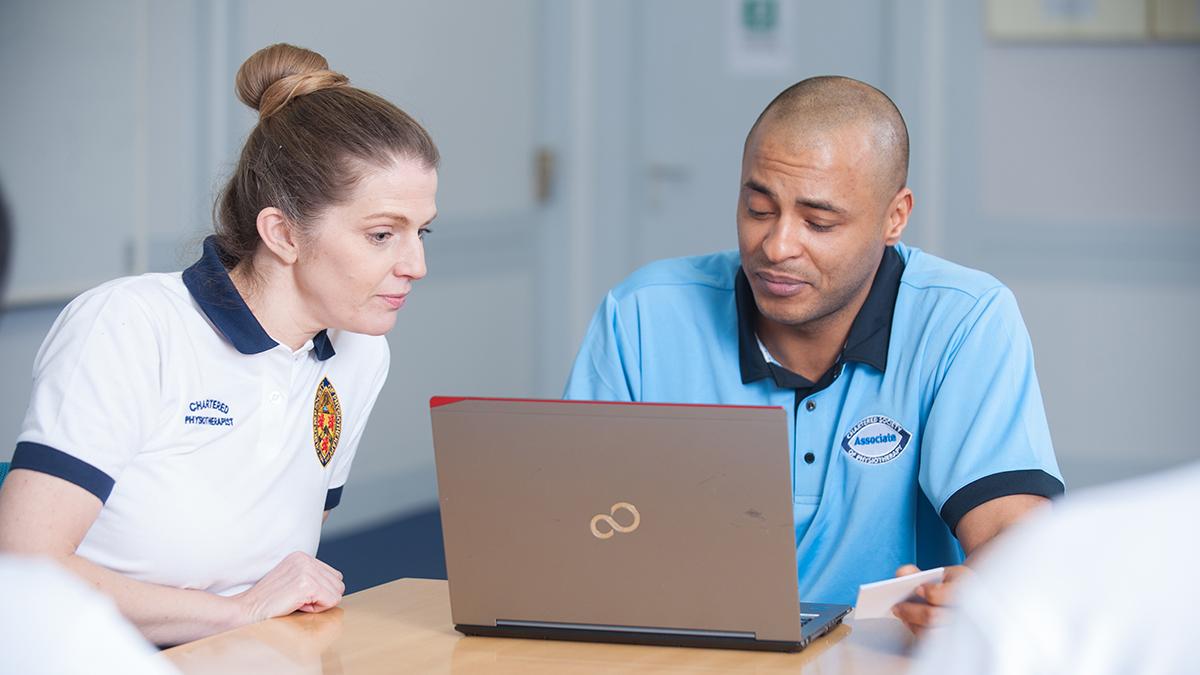Support workers can make a valuable contribution to pre-registration students’ practice-based learning and provide an enriched experience for learners.
On this page:

The role of the support workforce
Support workers can offer a safe and supportive space which can feel less intimidating for novice learners. They can do this in a variety of ways depending on their experience, level of practice and competence to support learning in practice. In addition, students get to learn what support workers add to a team; they can offer great peer support.
Working with students is considered a delegated activity and the named practice educator is accountable for their decision to delegate aspects of student training, supervision and support to a support worker.
Students gain:
- an understanding of the roles and responsibilities of support workers
- appreciation of the knowledge, skills and expertise held by the support workforce
- awareness of the principles that underpin safe and effective delegation to support workers
- an opportunity to learn and practice core technical skills most frequently undertaken by support workers but which are the foundation of registered practice.
Support workers gain:
- an opportunity to educate students about the role and value of the support workforce
- the chance to develop and hone leadership skills
- coaching and teaching skills
- the opportunity to influence the next generation of registered physiotherapists to be inclusive and to value diversity in their teams.
The Health and Care Professions Council (HCPC) position
Students must have a named practiced educator who is on a statutory register e.g. the HCPC.
Support workers do not have statutory registration so they cannot act as a practice educator responsible for overseeing a placement, but they can be part of a student’s practice education team.
The HCPC recognises that a variety of staff contribute to practice-based learning and it does not set standards or limits on models of learning.
Taking a team based approach
As part of a practice education team support workers bring a wealth of skills and knowledge that can support students’ learning on placement, including:
- technical competence in the tasks and activities they undertake in their roles
- communication skills
- cultural competence
- experience in person centred care approaches
- knowledge of local systems and processes
- an abundance of noticing, coaching and caring talents
- years of clinical and life experience.
It’s important that students understand the scope of practice, role, value and impact of the support workforce. This is to ensure that once registered they are able to work respectfully in practice teams and know how to delegate safely.
Support workers gain from the experience of supporting student’s on placement too! It’s a great opportunity to develop leadership, teaching, coaching and mentoring skills.

What does it look like in practice?
Entry level support workers (indicative NHS Band 2) can:
- induct students to their work area
- educate students about their role and responsibilities
- train students in the tasks and activities they undertake as part of their role
- support students pastorally as part of a compassionate and supportive team culture.
An intermediate or higher level support worker (indicative NHS Bands 3, 4 and higher) can:
- induct students to their clinical area
- educate students about their role and responsibilities
- train students to undertake the tasks and activities that are common to their role
- work alongside a student, enabling them to take the lead in a task or activity that is common to both roles and in which the student has been trained
- feed back to a student on their performance; supporting them to reflect and identify further learning needs and ways in which these might be met
- contribute to team discussions regarding a student’s performance and placement assessment
- support students pastorally as part of a compassionate and supportive team culture.
Note: Countersigning students’ records is permissible if local policies allow and if the support worker is deemed to be a competent in practice education (i.e. they have received training and development in practice education). The registered professional/s who is the named practice educator is accountable for delegating this aspect of student supervision to a support worker and remains responsible for service users’ care.
In addition, it should be expected that support workers welcome students in their teams and treat them inclusively, upholding the values of the profession and their local organisation.
Learn more about how support workers are playing a key role in student placements at Dudley Group NHS Foundation Trust.

Developing support workers to contribute to practice-based learning
Educating, training and supporting students on placement is a skill and requires specific competencies, which might include:
- teaching methods and approaches
- coaching techniques including advanced communication skills and how to provide feedback
- recognising when a student might be struggling
- supporting an underperforming student
- supporting an excelling student.
Support workers cannot be expected to contribute to practice-based learning without investment in their own learning and development to ensure they can undertake this aspect of their role confidently and successfully.
Investing in support workers’ learning in this way is necessary to empower them to contribute fully to practice-based learning. It is also a requirement from the HCPC that anyone contributing to practice-based learning is competent to do so.
Staff should be supported to identify strengths and gaps in their current knowledge and skills in education, training and supervision. Many support workers have had other careers and varied life experiences and may already be competent in certain areas.
There are various ways to support staff to develop competence and might include:
- local training and development programmes, either in-house or through an organisation’s learning and development team
- using the resources on the Health Education England e-learning for health platform as part of a local training programme (you don’t have to work in the NHS or in England to register for an account)
- working with your local Higher Education Institute (HEI) to enable support workers to attend elements of practice educator training.
Staff should also have access to education that enables them to sensitively and appropriately support students on placement who may need particular adjustments and those who come from diverse backgrounds.
Top tips for developing support workers
- Talk to your support workers about their role and students learning and how they feel about it.
- Update support workers’ job descriptions, job plans and annual objectives to include involvement in practice-based learning.
- Ensure support workers are fully competent and confident to contribute to practice-based learning- do they know their scope and boundaries and what to do if issues arise?
- Inform students from the beginning joining your team on placement that support workers will be formally contributing to their placement education and how they are a valued part of the team.
- Create regular and timetabled periods for students to spend with support workers in order that support workers can:
- induct a student to their role
- teach and train students in the tasks and activities they undertake in their role
- build a relationship with students in order to contribute to their pastoral support
- Share their learning and insights from the work they do and its contribution to patients pathways, care and experience
- ensure students understand the scope of practice of support workers; their value in the MDT and their impact in services
- fully involve support workers in discussions regarding feedback on a student’s performance and placement assessment.
Further resources
Download the full briefing paper on the role of support workers in practice-based education:
Role of the support workforce in pre-reg student education
Download a slide deck to access a presentation you can deliver in your workplace: